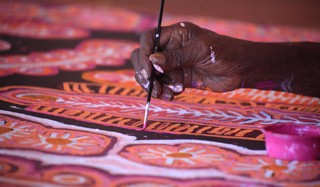
10 Interesting Facts About Aboriginal Art
21/10/2023
Aboriginal art, with its rich tapestry of symbols, stories, and traditions, offers a deep dive into Australia's indigenous culture. Whether you're an art enthusiast or someone keen on cultural history, these ten facts about Aboriginal art will captivate your interest.
1. World's Oldest Art Tradition and longest enduring art making culture
Aboriginal art is believed to be the oldest continuous art tradition in the world. Some rock paintings in Australia date back over 17,000 years, showcasing the deep-rooted history of Aboriginal culture.
2. Symbolic Storytelling
Australian Aboriginal art often uses symbols as a form of storytelling. These symbols can represent various elements like people, waterholes, or celestial bodies, and they narrate ancestral tales, known as 'Dreamtime' stories.
3. Diverse Art Forms
While dot paintings are internationally recognized, Aboriginal art encompasses a wide range of styles, including bark paintings, rock carvings, and body art along with sculptural forms including ceremonial poles and carvings.
4. Natural Pigments
Traditional Aboriginal art used natural materials found locally. Ochre, a natural clay, was a primary pigment, with earthy colors ranging from red and yellow to white, brown and black. Munupi Arts in the Tiwi Islands use natural ochres almost exclusively.
5. Art as a Map
Artworks often serve as maps of country, detailing the locations of waterholes, landmarks, and animal habitats. To the untrained eye, they might seem abstract, but they convey essential geographical information. This is a direct reference to traditional life on the land and the marking of directions in the sand as directions.
6. Ceremonial Significance
Art plays a crucial role in rituals and ceremonies. Body paintings, for instance, are integral to specific rites, with designs signifying the wearer's lineage, status, and the nature of the ceremony. The art was integrated directly into ceremony. It's only in recent years these designs have been transferred to modern materials designed to be shown to outsiders.
7. Contemporary Evolution
Today, many Aboriginal artists blend traditional techniques with contemporary mediums, creating artworks that resonate with both ancient traditions and modern sensibilities. These works are both modern and ancient.
8. Global Recognition
This unique art form has gained international acclaim with momentum growing. Artists like Emily Kame Kngwarreye and Ningura Napurrula have had their works showcased globally, highlighting the universal appeal of these indigenous masterpieces.
9. Art as a Livelihood
Art initiatives in Aboriginal communities, especially in remote regions, have become significant economic drivers, empowering artists and revitalizing local economies. Art centres like Warlukurlangu contribute to health and community initiatives and successful individual artists can sometimes support entire extended families.
10. Protection of Cultural Heritage
Due to its huge cultural significance, there are strict protocols and rights concerning the reproduction and exhibition of certain artworks. Works of national cultural interest can even be restricted from export in some cases. This ensures the protection and passing down of sacred stories and is integral in the understanding and respect of Aboriginal heritage.
Aboriginal art is not just a visual treat; it's a journey into an ancient culture, brimming with stories, traditions, and a profound connection to country. As global appreciation for this art form grows, it remains a testament to the rich cultural tapestry of Australia's indigenous communities.
